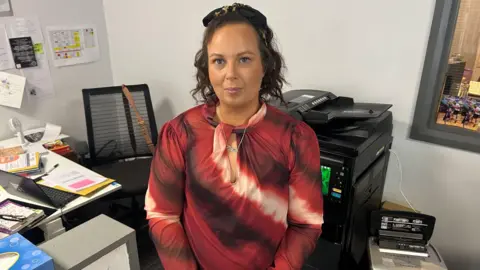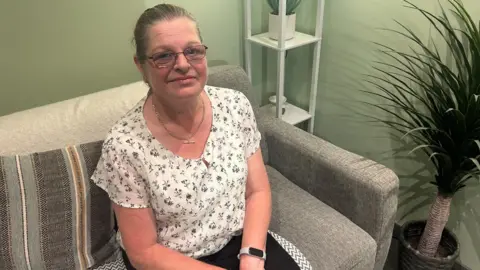Call to train workers to spot warning signs of suicide
 BBC
BBCAll frontline workers, including benefit officer workers, teachers, housing and health workers, should be trained in identifying the warning signs of suicide, a west Belfast MLA has said.
Órlaithí Flynn, who has introduced a Suicide Prevention Training Bill, said suicide remains a "major public health issue in Northern Ireland".
The bill would place a statutory duty on all government departments to train workers who work with the public to identify suicide's warning signs.
Latest NISRA figures, from 2023, show that 221 people took their own lives in Northern Ireland.
'Devastating statistic'
Flynn said 70% of the people that lose their lives by suicide are not involved in mental health services.
"That's a devastating statistic," she added.
"What more can we do to try and reach that 70%? It's important if you come into contact with someone who you think is suicidal that you then have the knowledge and the skills to signpost them to advise them and to guide them.
"That could be the decision that actually saved someone's life," Flynn told BBC News NI.
Nisra statistics also show that those living in Northern Ireland's most deprived areas are more than twice as likely to take their own lives than that of the least deprived areas.
'Extremely busy'

Eilish Craig from West Wellbeing, a mental health and suicide prevention charity which helps hundreds of people every year, said the need for suicide prevention was deprived areas was "really high".
The charity is extremely busy.
"The north of Ireland is a post-conflict society," Ms Craig said.
"Transgenerational trauma within communities, within families, exists. People in deprived areas are also living on the breadline, so they need support around all of this."
"We are dealing with one to two crises a day," she told BBC News NI.
"That is someone turning up at our door in extreme need. They'll tell us: 'I can't keep myself safe.'
The charity has welcomed the bill, but has questions how it will be funded if it becomes law.
"In theory this bill is going to be absolutely brilliant because more people need to recognise the signs of suicide," she said.
"My only concern would be, once we identify these people, once we recognise the signs, what do we do next? Where are they going to go? Because of the cuts in the NHS, services are really under pressure.
"It can only be a good thing to have people trained to spot the signs of suicide, maybe it'll create conversations in work places but it's what happens after that?"
How will it be funded?
Flynn, who is the mental health champion for Sinn Féin, said she was "totally conscious about the costs," as well as the "massive burden and strain" that the health service is under at the moment.
"I believe the health minister is constrained in terms of what he can do. I believe if he had the money to fully implement the mental health strategy, if he had the money to fully implement the suicide prevention strategy, he would. I don't think financial constraints is an argument to make for not bringing forward this bill".
In a statement, the health minister said his department has undertaken some early engagement with Flynn around her Private Members Suicide Prevention Training Bill.
"This is a complex area which requires careful and detailed consideration. I have offered to continue to work with the member in this matter," added Mike Nesbitt.
'I was not coping'

Christine Murray, who uses the counselling services at West Wellbeing, agreed.
"The more people that can spot the signs of suicide the better to try and keep the numbers of people taking their own lives," she said.
Ms Murray has experienced depression.
"I was not coping. If I didn't have West Wellbeing services I don't know how things could have gone," she added.
"These services are vital. You have to ask for help. It's worth it. I am still here."

Professor Siobhán O'Neill, Northern Ireland's mental health champion, said she would not recommend mandatory training for all front-line workers.
"In many many cases there are no warning signs, people don't talk about this stuff, or the signs are really subtle," Prof O'Neill told BBC Radio Ulster's Good Morning Ulster programme.
"Recognising when someone is thinking about suicide and having those conversations and thinking about the warning signs – that's a much more complex matter."
Prof O'Neill added that such training is really expensive and resources are not available to roll out training packages on a widespread basis.
"If we have money to invest in this area what we really need to be doing is fully funding our regional crisis intervention service which will provide the type of support that will make a real difference to people who are struggling," Prof O'Neill told the programme.
'Save lives'

If the bill is passed, Flynn hopes this training would also be rolled out to arm's length bodies.
"Any government employee who works with the public day and daily will be provided with some form of suicide prevention training."
Flynn said the proposed legislation was not about making everyone a suicide prevention expert, but for them to know how to spot the warning signs.
"It's the signposting that will save lives," she added.

Flynn has launched her own consultation seeking views on her Suicide Prevention Training Bill.
The proposals are part of a Non-Executive Bill, which offer individual MLAs the chance to introduce legislation independently from the Executive departments, but follow the same scrutiny process as Executive Bills following introduction.
If any of the issues in this copy have affected you, details of help and advice are available on the BBC Action Line website.
